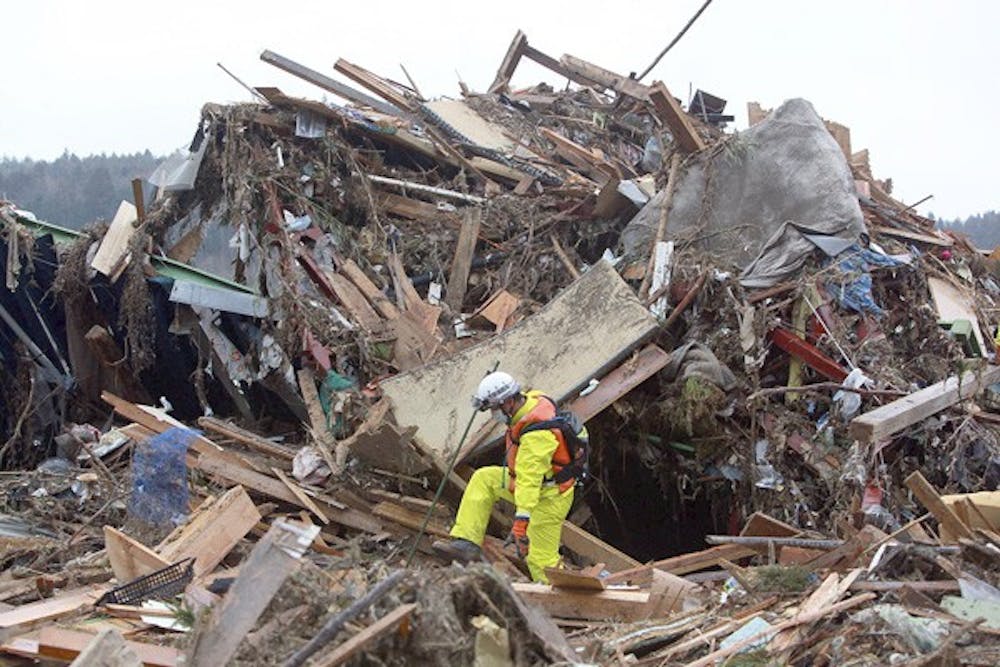Asian languages senior Chase Brown clutched the doorframe of his Tokyo apartment as the building shook harder and harder. Even though the epicenter was more than 200 miles away, Brown could feel the force of Japan’s 9.0 magnitude earthquake.
“I’m just thinking, ‘Oh my God this is happening,’ there’s no other way to factor it than, ‘Oh my God,’” Brown said.
Brown was one of 11 ASU students studying abroad in Japan when the quake occurred March 11. Recorded as the fourth largest earthquake since 1900, the ground started shaking at 2:46 p.m. (10:46 p.m. Thursday Phoenix time), and triggered a devastating tsunami that swept away thousands of homes and lives. The number of confirmed dead on Sunday was 8,450, but police in the Miyagi Prefecture — the area nearest to the quakes epicenter, about 230 miles northeast of Tokyo — said deaths in the area could exceed 15,000, according to a Reuters report.
"I know I speak for the entire ASU family when I offer my deepest sympathy to the Japanese people and my sincerest hope that there will not be further destruction," ASU President Michael Crow said in a statement to the ASU community. "The process of rebuilding will be a long one but there are immediate needs for the survivors including food, water and medicine."
Brown said the strength of the earthquake in Tokyo was estimated between a magnitude of 5 to 6.7. None of the 11 ASU students in Japan were injured.
After the earthquake, Brown said ASU gave him the option of leaving Japan or staying. He chose to stay given all the work he had put in.
Brown had been living in Tokyo since September at Waseda University, where he was enrolled in 13 credit hours under the Intensive Japanese Language Program through ASU Study Abroad. He was on break from school when the earthquake struck.
Brown said many locals “are getting numb to the shocks,” referring to the aftershocks that are still occurring. The United States Geological Survey has reported 536 aftershocks since March 11.
ASU is currently offering counseling to Japanese students in Arizona and to ASU students in Japan via Skype.
For now the spring semester at Waseda, which normally starts in April, has been postponed until May because of aftershocks and rolling blackouts. But Brown said he also fears another tectonic plate might shift, causing another large earthquake closer to Tokyo.
For about five days after the earthquake, Brown said Tokyo grocery stores were out of food. Though now replenished, the stores currently only allow each customer to buy one loaf of bread and one bottle of water to prevent the hoarding of food.
While excess levels of radiation have been found in vegetables like canola and spinach from farms near the Fukushima Dai-ichi nuclear complex northeast of Tokyo, officials said levels were not large enough for any immediate concern.
ASU senior lecturer in Japanese Miko Foard said she felt fortunate that her family in Japan was safe. As an adviser of the University’s Japan Student Association, she has helped plan fundraising efforts throughout this week.
“The first thing and only thing we can do is collect money for relief,” Foard said.
The Japanese Student Association performed the traditional northern Japanese Sora-Bushi dance Sunday at the WorldFEST in Heritage & Science Park Downtown to collect donations for relief efforts. Funds were sent to Japan through the Mercy Corps, management senior and JSA Vice President Daisuke Ichinose said.
Other events planned include a Japanese movie day sponsored by The Bridge of Japan-America club and a benefit dinner sponsored by the Japanese Graduate Student Association.
Japan consul general Junichi Iharas, who works with people in both Southern California and Arizona, expressed his gratitude toward Americans trying to help with relief efforts in a written statement.
“On behalf of the Japanese Government, I would like to take this opportunity to extend my sincere appreciation to each and every person, group, and organization that has voiced their concern for and willingness to help the people of Japan,” Iharas said.
Reach the reporter at hhuskins@asu.edu
UPCOMING EVENTS TO BENEFIT JAPAN
March 24 (TH) — Flea market including books and Japanese goods in front of the fountain by the MU (JSA and Japanese language faculty and students) 11 a.m. to 3 p.m.
March 29 (T) — Food sale on Hayden Lawn (JSA and Japanese language faculty and students.) 11 a.m. to 3 p.m.
April 4 (Mon) — Benefit Dinner in Turquoise Room, MU 220 (About 200 seating) (Japanese Graduate Student Association and Japanese Language Faculty and students.) Time TBA.
Date TBA — All Day Japanese Film Festivals in the MU. (Bridge of Japan America and Prof. Sybil Thornton, Associate Professor of History)
All dates and times are tentative.





